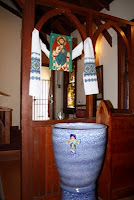 The imagery in Matthews Gospel is most powerful. Jesus, who has been in prayer for a while after the death of John the Baptist, goes off to a secluded place. The people who have seen and heard all of the marvelous actions of Jesus travel so as to catch up with him. When Jesus sees the crowds of people his heart is moved with compassion. He heals their sick and proclaims the Good News to them.
The imagery in Matthews Gospel is most powerful. Jesus, who has been in prayer for a while after the death of John the Baptist, goes off to a secluded place. The people who have seen and heard all of the marvelous actions of Jesus travel so as to catch up with him. When Jesus sees the crowds of people his heart is moved with compassion. He heals their sick and proclaims the Good News to them.There is a dialogue between Jesus and the Apostles. The Apostles suggest that Jesus send the people to the nearby towns for food. Jesus replies that they the disciples provide for for them. The miracle that we the hearer witness is that what little they have is multiplied by Jesus. In another part of the same Gospel we are reminded that the person who possesses gifts will be given more gifts. St. Paul will tell us that these goods things are given for the good of the community.
A theology professor from Yale university, Dr. Kathryn Tanner, comments that Jesus is not an incomprehensible stand-in or substitute for God. Jesus is the Incarnation of the Word of God. Jesus displays in his life what it means to be the flesh and blood of God the Father. This human Jesus recognizes our needs and enables us to be fed and healed. Jesus gives us every grace and blessing in abundance.
St. Paul wants us to understand that Christ delivers us through his compassionate love, which is best understood on the cross. Jesus' blessing of the bread and fish connects to the Last Supper, and the Eucharist in which we share. We gather around the altar with numerous hungers, hurts and needs. We cannot allow fear or other distractions to prevent us from being fed and healed. Once we are full and made one with the Father, and each other, we can 'Go forth to love and serve the Lord.'
Jesus becomes in a real and tangible way food for our journey. It is enough so that we can share Good News with each other of all that we have seen and heard. The Church, and ourselves, become a sign and symbol of the Christ who is our salvation and peace. We do no have to go away to find solace and food, in Jesus we have more than enough to eat.
